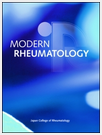 Although intensive immunosuppressive treatment is necessary for the severe cases with polymyositis (PM)/dermatomyositis (DM), the prognostic factors or disease activity indices for PM/DM have not been established.
Although intensive immunosuppressive treatment is necessary for the severe cases with polymyositis (PM)/dermatomyositis (DM), the prognostic factors or disease activity indices for PM/DM have not been established.
Here the authors investigated the association between serum microRNA-1 (miR-1) level and clinical course of patients with PM/DM.
They retrospectively reviewed baseline clinical and laboratory findings, treatment regimens and outcomes in patients with PM/DM. The serum samples were collected from PM/DM patients and healthy controls (HC). Serum miR-1 levels were determined by quantitative real-time PCR.
Twenty-two patients were recruited. The average serum miR-1 level was significantly higher in the PM/DM as compared to HC (p = .0085) and was decreased by treatment (p = .032). The clinicians divided the PM/DM-ILD patients into two groups, high and normal miR-1 groups. Although there were no significant differences in the clinical data and the initial prednisolone (PSL) dose between the two groups, PSL dose at 16 weeks, cumulative PSL dose until 16 weeks, and frequency of serious infections were significantly higher in the high miR-1 group as compared to the normal group (p = .025, .036, and .026, respectively).
The authors propose serum miR-1 as a promising novel biomarker for predicting therapeutic response in PM/DM-ILD.
